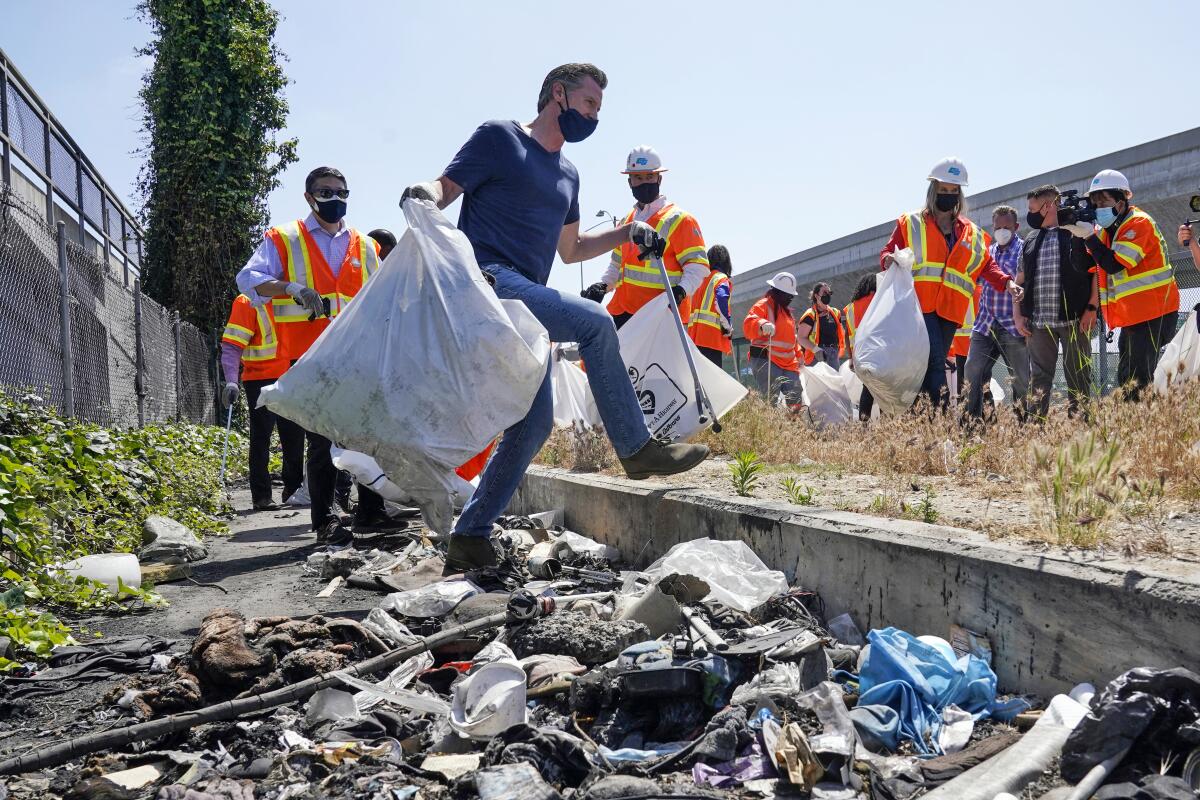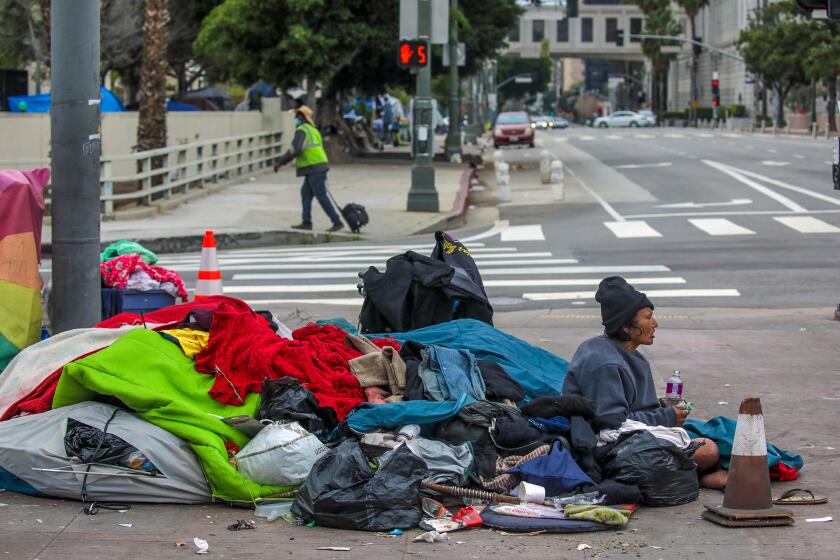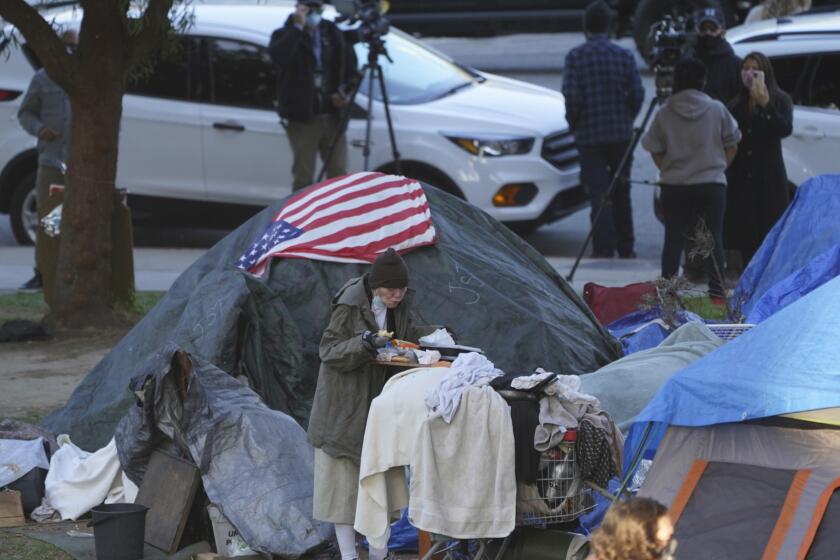Newsom’s new push for homeless mental health treatment lacks details. That has some worried

At the heart of Gov. Gavin Newsom’s proposal to compel people into court-ordered treatment for mental illness and addiction is a sense of urgency to solve a decades-old crisis festering on California’s streets — even if it means building the plane as it flies.
“We’re coming up with a completely new paradigm, a new approach, a different pathway, and it’s consistent with our values,” Newsom said earlier this month when he announced the Community Assistance, Recovery and Empowerment Court.
Newsom has not provided a price tag for how much CARE Court could cost, but it would likely be paid for with a portion of the projected $14 billion he wants to spend on addressing homelessness over the next several years. He also pledged swift action in the coming weeks to finalize the proposal and move it through the Legislature.
“We want to move, and we want to move quickly,” Newsom said during a recent interview on KQED. “It’s a new day, new paradigm, and we are looking forward to getting something big done.”
Despite the urgency, the number of people who would likely benefit from the initiative is limited. Newsom’s administration believes that 7,000 to 12,000 people could qualify for the court-ordered care, a fraction of the estimated 161,000 people experiencing homelessness in California. Those who would qualify are characterized by experts as the hardest to reach and most difficult to treat, largely because they have a variety of complex needs and are often hesitant to trust government intervention.
Dr. Margot Kushel, a professor of medicine at UC San Francisco and director of the Benioff Homelessness and Housing Initiative, applauded the administration for promising resources, but cautioned against thinking CARE Court would be a blanket solution to the crisis.
“This is a very small segment of the population. This is not going to end homelessness,” Kushel said.
Gov. Newsom proposes plan to help homeless Californians with severe psychiatric, substance abuse and addiction issues get into housing and treatment.
Dr. Jonathan Sherin, Los Angeles County’s director of mental health, estimated that CARE Court would target 10% or less of the total homeless population. But he welcomed the proposal as a “move in the right direction” to prioritize resources for California’s most vulnerable residents, even if the initiative involves “growing pains.”
“It’s a part of the population that has been suffering and languishing for so long, many of whom have been on the streets for literally years and years and some decades and at great peril to themselves,” Sherin said.
Earlier this month, Newsom billed the CARE Court proposal a departure from the “status quo” of addressing homelessness, addiction and mental illness in California. The program would allow family members, behavioral health providers and first responders to ask civil court judges to order a clinical evaluation and, if necessary, implement a plan for a person in need. CARE Court is intended to be a voluntary program, and each plan would come with a public defender and a personal advocate as part of a “client-centered” approach.
The CARE Court proposal promises behavioral health treatment, medication and a housing plan as tools to stabilize participants who struggle with addiction and untreated psychiatric disorders such as schizophrenia, for up to two years. Not every participant would need to be homeless to qualify, but the Newsom administration expects CARE Court could help thousands of people who have spent years living without a home, as well as those cycling in and out of jails and hospitals.
After announcing the broad framework of his CARE Court plan, the real work begins for Gov. Gavin Newsom.
“People have had it. They’re just exhausted,” Newsom said during the KQED interview. “They can’t take what’s happening on the streets and sidewalks. They can’t take what’s happening in encampments and tents.”
A central component of CARE Court is accountability, which Newsom said will drive results. Local governments face sanctions if they do not comply with program requirements.
But it’s the money needed to run CARE Court that concerns local officials.
Graham Knaus, executive director of the California State Assn. of Counties, said new funding to bolster behavioral health infrastructure is appreciated, but would not be enough to infill decades of disinvestment in the workforce and treatment programs needed to make CARE Court successful.
Concerns about rising crime and the homelessness crisis emerged as the top issues driving voter dissatisfaction with Gov. Gavin Newsom.
“If additional behavioral health services are required for this CARE Court-related population, then the funding attached to those services needs to be present as well,” Knaus said. “Our behavioral health system is stretched very thin.”
Housing is also a critical concern.
Newsom included $3 billion in the budget last year to increase behavioral health housing by 22,000 treatment beds, and proposed another $1.5 billion this year to bump that number up to 33,000.
But it takes time to build capacity, said Phebe Bell, behavioral health director for Nevada County and the president of the County Behavioral Health Directors Assn.
“Turning money into beds takes years in my experience,” Bell said, adding that “there will be this gap period where the $1.5 billion has not translated into thousands of new beds.”
And the type of housing available is just as important as how much of it there is, said L.A. Family Housing President and CEO Stephanie Klasky-Gamer. The state must invest in permanent affordable housing options in addition to building interim units such as tiny homes and hotel rooms, she said.
Mayoral candidate and Councilman Kevin de León wants the city to withdraw from the Los Angeles Homeless Services Authority.
“We have exploded in bringing more interim housing beds online. Because people just want to get people inside off the streets,” Klasky-Gamer said. “And that is great, but if you keep doing these interim housing solutions, you are not solving homelessness for them, you are hiding them.”
Those concerns are likely to be raised as Newsom continues to conduct roundtable discussions with stakeholders throughout the state. Lawmakers similarly expect answers to these questions before Newsom submits a formal proposal to the Legislature.
Timing is also a key decision for Newsom. The governor wants to work the proposal through the budget this spring so the CARE Court program is ready to go into effect when the new fiscal year starts on July 1, as opposed to implementation after the lengthier policy process.
Senate President Pro Tem Toni Atkins (D-San Diego) said the issue is a “high priority” for her members, and appeared open to the idea of the proposal being worked out through the budget. Katie Talbot, spokesperson for Assembly Speaker Anthony Rendon (D-Lakewood), said the idea would “need to go through the policy committee process.”
Jason Elliott, Newsom’s top housing advisor, said it is up to the legislative leaders to determine the mechanism for implementation, but requested urgency to codify the law by July 1.
Two Democrats have already introduced a bill that parallels the governor’s proposal. State Sen. Susan Eggman, a Stockton Democrat and one of the authors of Senate Bill 1338, said she was optimistic that CARE Court would initiate greater oversight in the mental health system and help those most in need through early interventions.
“I think everyone thinks this is the year to really get things done,” she said. “There is a crisis on our streets.”
More to Read
Start your day right
Sign up for Essential California for news, features and recommendations from the L.A. Times and beyond in your inbox six days a week.
You may occasionally receive promotional content from the Los Angeles Times.











